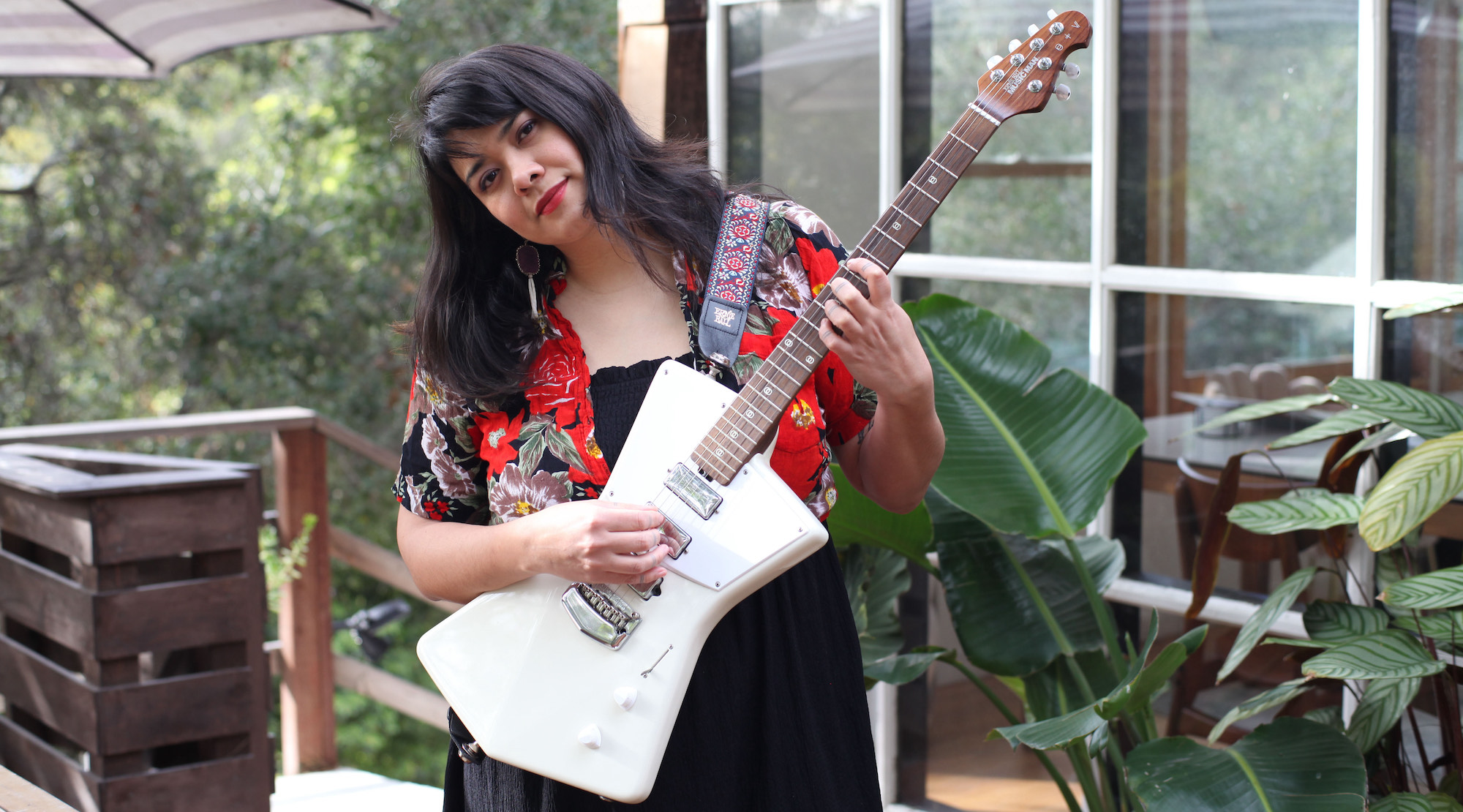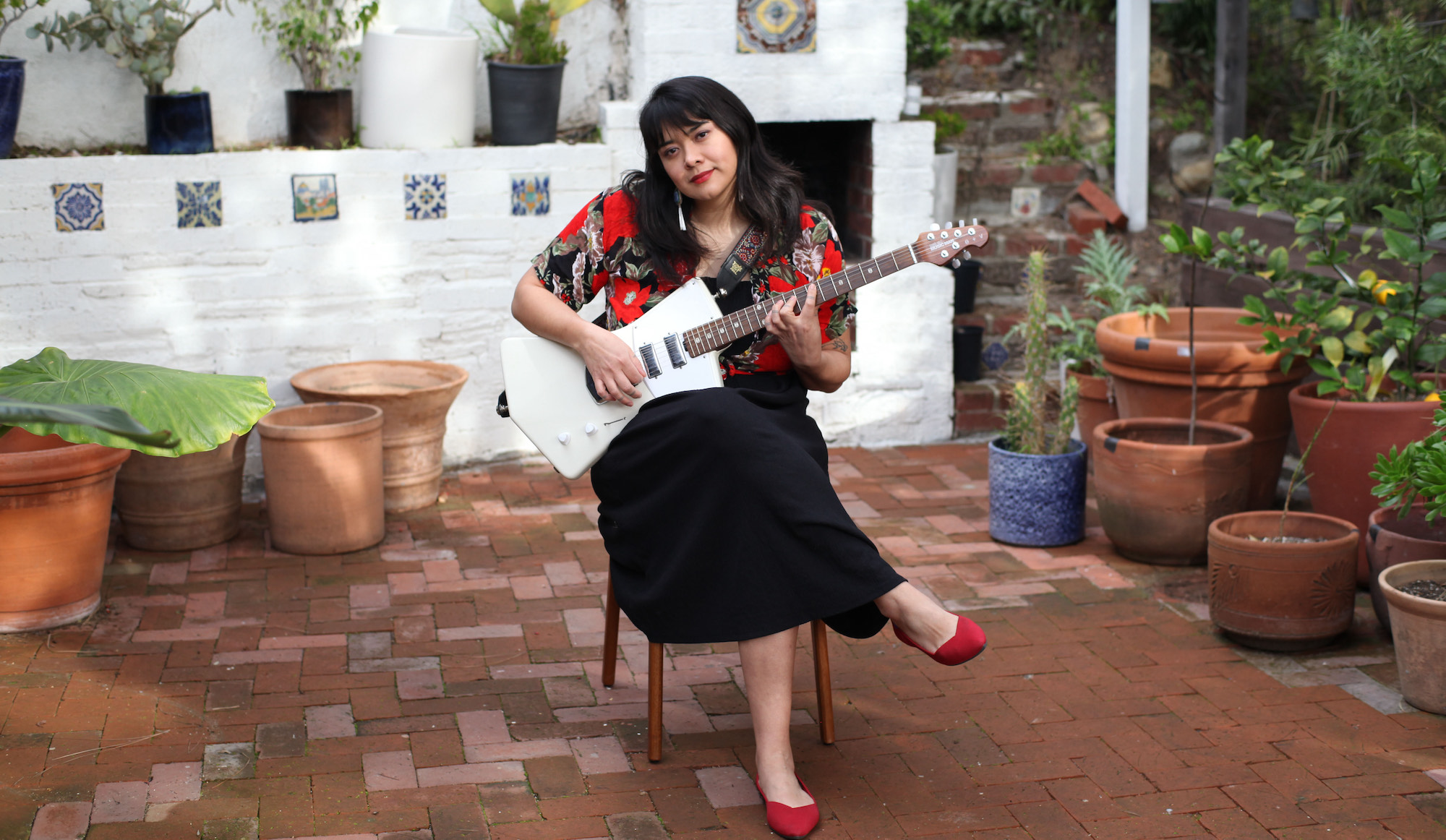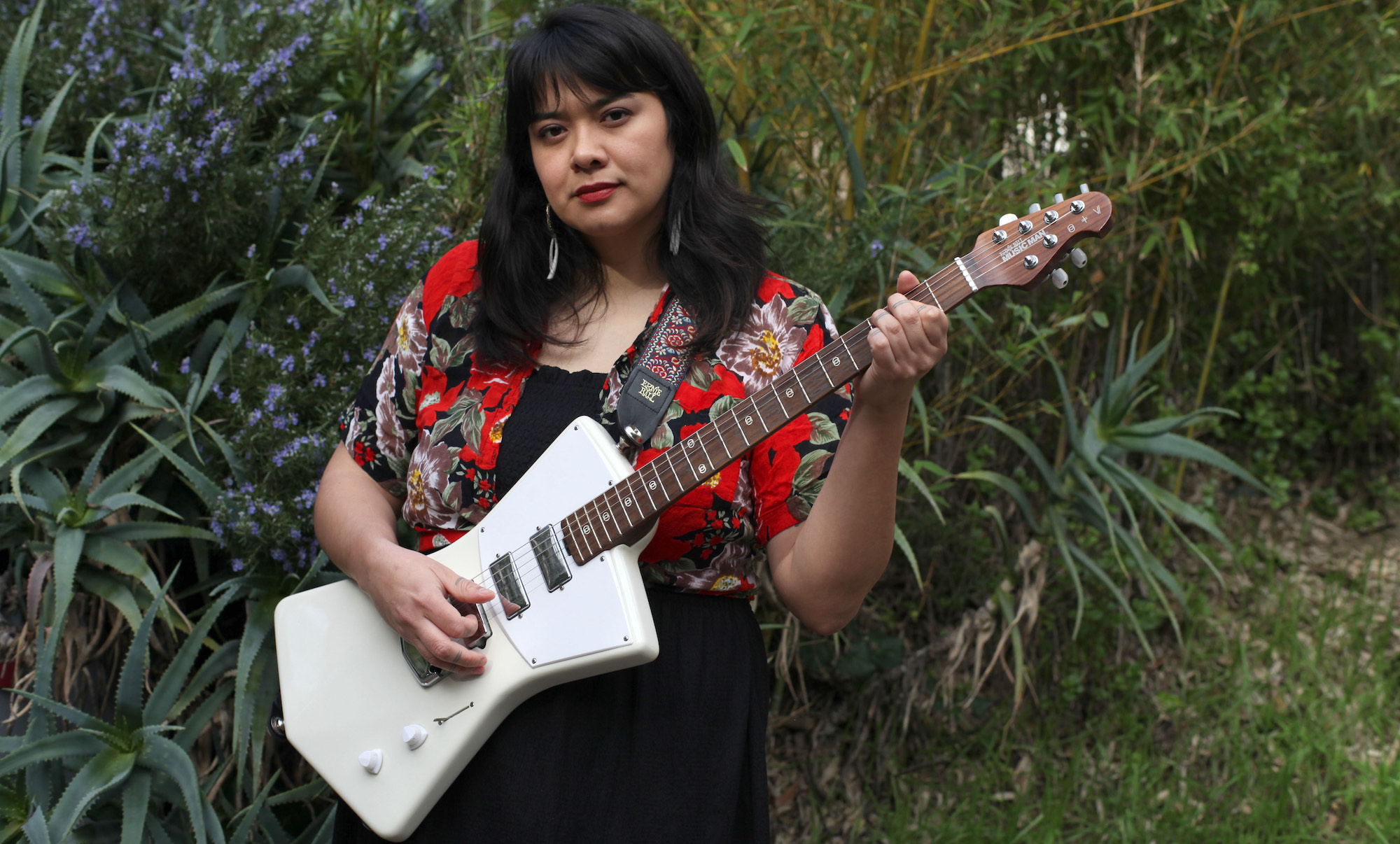Black Belt Eagle Scout on how the Ernie Ball Music Man St. Vincent model, Fender Princeton Reverbs and nature all inform her powerful, emotive guitar sound
Ahead of stellar new LP, The Land, The Water, The Sky, Katherine Paul reflects on her guitar journey so far – from her beginnings on a Guatemalan classical model to learning power chords from Nirvana VHS tapes

Katherine Paul is the singer and songwriter behind the Pacific Northwest-based Black Belt Eagle Scout. In her emotive, nuanced, and typically guitar-based songs, Paul touches on her homeland, her family and her Indigenous ancestors, interspersed with narratives from her own unique vantage point.
Black Belt Eagle Scout is signed to Saddle Creek Records, and has enjoyed quite the run of success of late, from an acclaimed KEXP in-studio performance a few years ago to, more recently, garnering a song placement in the popular television series, Reservation Dogs. Paul's latest accomplishment is Black Belt Eagle Scout's stellar new LP, The Land, The Water, The Sky, which is set for release on February 10.
Here, Guitar World catches up with Paul to talk about the new album, her first foray into playing guitar, how she taught herself by watching old grunge VHS tapes and what she loves most about the instrument.
When did you first find the guitar, and do you have a favorite memory from it early on?
“I first found the guitar when I was on a trip to Guatemala with my mom. My mom is an anthropologist and an attorney, and when I was growing up, she would take me on these cultural trips around the world. So, we were in Guatemala on a cultural trip and there was a guitar that was at a little booth where people were selling. I saw it and had wanted to play guitar, so she bought it for me. We traveled back to the States with it, and I still have it.”
How old were you at the time, and can you describe what that guitar looks like?
“It was a handmade classical guitar. So, somebody made it. It’s put away right now so I can’t easily access it, so I can’t tell you if it’s by somebody [in particular], but I know that it’s handmade. And, heck, how old was I? I was in middle school – I can’t remember exactly how old I was.”
Get The Pick Newsletter
All the latest guitar news, interviews, lessons, reviews, deals and more, direct to your inbox!
From there, how did you get better and what were your goals as you were doing so?
“So, I’m self-taught. I took one or two guitar lessons, but it just wasn’t for me. I [felt] like it was moving too slow – I wanted to try and just play. I grew up in the Pacific Northwest and there’s a huge music scene here, obviously. You just hear about it naturally, just from [living in] the area.
"It’s a mix of a lot of local music that is also national and mainstream at the same time. I got really into Nirvana when I was a teenager and would get these VHS tapes and I think, at the time, I just really wanted to play loud guitar music, and I thought, 'This band does loud guitar music!’
“I had read articles about Nirvana and I knew that they played power chords [Laughs]. [Watching the VHS tapes], I thought, ‘I bet what they’re playing on the screen right now is a power chord,’ so I’d pause it and see their finger formations on the guitar, and then I’d try to imitate that. I was sort of just trying to figure out how to learn in my own ways and have that freedom to figure out the guitar [on my own].
“I feel like I wasn’t... I wouldn’t call myself a good guitarist until more recently. I was all right at guitar – I just got by with playing notes here and there. More recently, in the last five years, I feel like I got really good at guitar, and now I feel comfortable identifying as a guitarist.”

It seems like in your music, your music videos, and in how you talk about your work, that representation, looking at history with clear eyes, and a sense of inclusivity are all important to you. So, how can the guitar be used for these aims? As a tool, let’s say, for revolution, healing or reconciliation?
“That’s a great question. I’ll tell you specifically about one of my latest songs because I think the way that I do things is represented in that song. It's called My Blood Runs Through This Land – it’s the first track off the album. The way that I play guitar [on that song] – I think it emulates who I am and my identity. I just put all of it into playing guitar. I write first and foremost on guitar, and it’s a very central focus of my songwriting.
“My Blood Runs Through This Land is filled with all of these intense guitar riffs where I’m sort of doing a tremolo, but it’s a little bit more of a hectic tremolo, like a shredding tremolo on some of the guitar lines. I wanted to make it hectic because those lines, to me, represent the power and the freedom that my relatives, my ancestors, have within our homelands – [they represent] quite literally running through the land.
“I wanted to try and create a sound that exemplifies that we are running through this land, we are free in this land, and this is our homeland. We are powerful. So, I write just about who I am and [how] I happen to be Native and happen to come from my homelands and live in my homelands right now – that’s just what I like to share. I feel like with whatever type of music I play, I’ll always be sharing some form of who I am just because I write from a place of the heart.”
On a similar thought, what does the idea of home mean to you? And how is the guitar connected to that idea?
“I think my music has grown a lot since I moved home [Paul recently moved back to the Swinomish Indian Tribal Community in Washington, where she was raised, after living in Portland, Oregon]. I think that there is a lot of grounding feeling here with being connected to my home and being held and supported by my home. I feel like it fed my creativity. I think that it gives me more energy to play guitar, is what I’m trying to say.
"I think that when I play guitar and play music, it always feels the best when I’m in a grounded space and I think where I feel the most grounded is at home, in terms of creating music.”
The Land, The Water, The Sky opens with big electric guitar sounds and the instrument is prevalent throughout the album. You wrote it at home – did you put a lot of thought into how the guitar sounds blended in with your natural surroundings there?
“Yeah, I mean, I feel like all my life I have just loved guitar music. I love the intensity that guitar can bring to a song, even if it’s a really faint lead-in somewhere, a little garnish of something. I feel like that still has this level of intensity that helps move a song along. I just tried to have moments of that within the music just because I love intense guitar music and it makes me feel really exhilarated.
"So, there are [a lot of] lines – I stack guitar lines on guitar lines in this album. Then there’s melodies and melodic fingerpicking lines throughout. So, I’m really excited to speak to you and Guitar World because it’s really cool to be recognized as a guitarist in this magazine!
"You asked about nature. I think nature plays more of a setting for creativity for me when I write music. Sedna is a song that I wrote out on a lookout point at the tip of an island peninsula near my house, and I remember it was really windy that day. I just tried to lean into that. [There are] specific settings within nature that I try and lean into to get that power to use within my songwriting, which happens primarily on guitar.”
When you write a song, how do you think about your voice and it working with or blending with your guitar playing, like on Sedna, Treeline or My Blood Runs Through This Land?
“That song in particular [Sedna] is unique because I was very specific about how I wanted my vocals to sound in the recording of that song. But generally, it just comes out naturally and the vocal line will come out during the guitar line.
"When I’m writing, when I’m figuring the song out, the vocal line will come at the same time. I just sing naturally – whatever comes out is how I feel like it should be. But with that song, I needed the EQ to sound a specific way. So, it took a while for me to be satisfied with it, specifically for the vocals. But other songs I was just, like, ‘Sounds great how it is!'”

What about gear – amps, pedals and guitars? Do you have anything that’s a must-have when you write or record your music?
“So, I play two guitars right now. Primarily, I use the Ernie Ball Music Man St. Vincent guitar. It’s one of the original ones that they made that you can’t get anymore because the neck is made out of rosewood.
"I think I just got it because I like St. Vincent and I like that she made it. My friend had one and I thought it was a cool guitar, and I really liked it when I started playing it.
“So, I play one of those primarily. Another guitar that I play for a couple songs is a Fender Telecaster. I have one of the newer ones that Fender made. For a while, back in the day, there was an older one that I was playing that I was borrowing from a friend – it was from the '60s, and was really nice.
“I love Fender amps, too. I recorded most of the album on a Princeton Reverb amp that was from the '60s, but I have a newer one that I tour with. I love how those amps sound.”
How about the future? You have the album coming out and some tour dates set for February, too. You’ve also had some songs in the Reservation Dogs television show, which I imagine is pretty exciting.
“I’m going to try to go on tour a lot this year just because there’s an opportunity to, and I’m going to try and work on some new music. I don’t know when that’s going to happen, between all the touring, but I’m hoping to not let that creativity sit for too long. I’m also going to do some collaborations.
“I’m working with my friend Mato Wayuhi, who did the scoring for Reservation Dogs. I’m hoping to get more into scoring, but I also have that big headline tour that I recently announced, which will be cool!”
Final question – what do you love most about the guitar?
“I love how it makes me so happy! I love the feeling that I get from playing guitar.”
- Black Belt Eagle Scout's The Land, The Water, The Sky is set for a February 10 release on Saddle Creek Records.
“It holds its own purely as a playable guitar. It’s really cool for the traveling musician – you can bring it on a flight and it fits beneath the seat”: Why Steve Stevens put his name to a foldable guitar
“Finely tuned instruments with effortless playability and one of the best vibratos there is”: PRS Standard 24 Satin and S2 Standard 24 Satin review









